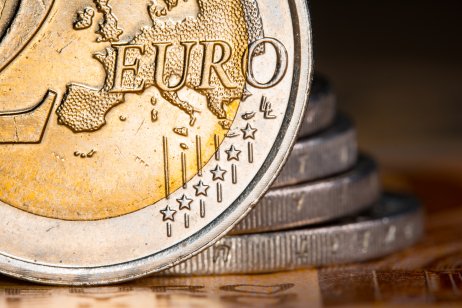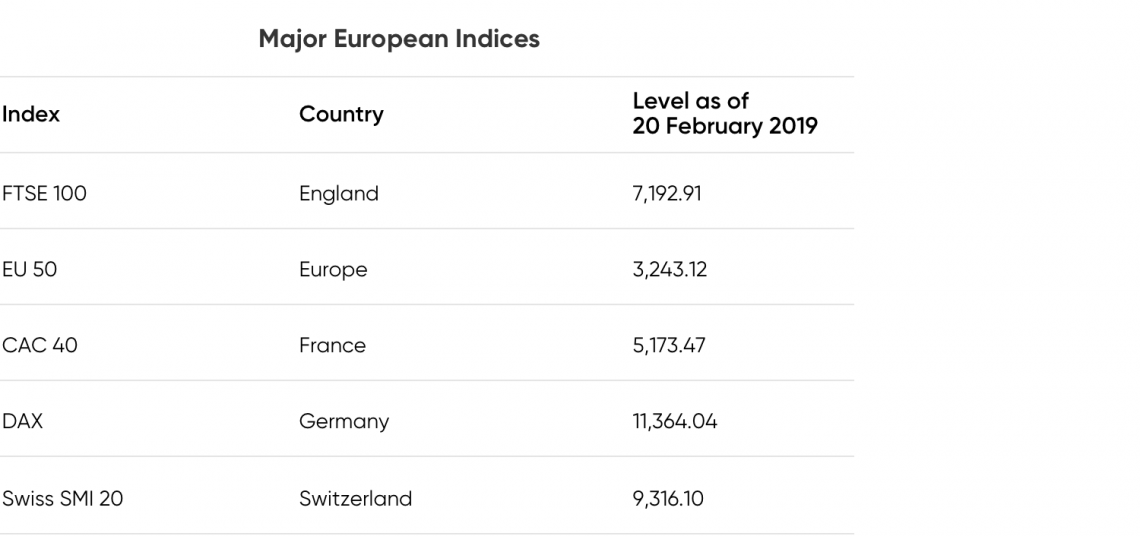3 facts you need to know about the European stock market
10:12, 22 February 2019

As we are approaching the closing stages of the economic cycle, the global economic picture for 2019 looks rather challenging. Experts believe that European equities may remain hostage to messy political situations across the region in the year ahead. Let’s take a look at some key facts about the European stock market, with a closer look at European equities in 2019.
What is the European stock market outlook for 2019?
Recently, European stock market news has been characterised by uncertainty, ranging from slightly positive to drastically bearish.
Brexit in the UK, the budget deficit in Italy, protests in France, Angela Merkel’s standing down as CDU leader in Germany and the European Parliament elections in May are likely to influence the European stock market in 2019.
However, it is the expectation that European equities will remain volatile in 2019, which can open good investment opportunities for traders. Political uncertainties allow you to select undervalued stocks and buy them at attractive levels.
Meanwhile, choosing individual stocks has never been easy. If you still want to enter the European market, you can follow the major European stock market indices and catch up with the latest trends.
What is your sentiment on EA?
What are the major European indices?

FTSE 100
The Financial Times Stock Exchange 100 Index, commonly referred to as the FTSE 100, is a benchmark index that is commonly seen as a gauge of the UK economy’s performance. It represents 81% of the UK’s market value on the London Stock Exchange.
The FTSE 100 includes shares of the 100 companies listed on the London Stock Exchange with the highest market capitalisation.

The Euro Stoxx 50
The Stoxx Europe 50 is the popular market index of the largest blue-chip companies from 18 countries in the eurozone. Introduced in February 1998, the EU 50 represents the leading European businesses, covering almost 50% of European stock market capitalisation.
Geographically, the index comprises stocks from the United Kingdom, Switzerland, Sweden, Norway, Finland, Spain, Portugal, Luxembourg, Netherlands, Italy, Germany, France, Denmark, Austria, Belgium, Czech Republic, Ireland and Greece.
CAC 40
The Cotation Assistée en Continu, better known as the CAC 40, is a benchmark index of the French stock market performance. The index represents the 40 businesses with the highest market capitalisation on the Euronext Paris stock exchange.
The CAC 40 is one of the largest European stock markets and one of the most important national indices of the Euronext pan-European stock exchange group.

DAX 30
The Deutscher Akrienindex, or simply the DAX 30, is seen as a gauge of the health of the German economy. The index tracks the performance of the 30 biggest companies traded on the Frankfurt Stock Exchange (FSE). The DAX 30 constituent businesses represent almost 75% of the total market capitalization of the FSE.
For a long time, the German economy has held a leading position in the European Union, estimated as the fifth largest economy globally. That is why so many traders choose the DAX 30 to invest in the European stock market.
Swiss SMI 20
The Switzerland 20, often referred to as the Swiss Market Index (SMI), is the most highly-valued blue-chip market index in Switzerland. The SMI tracks the performance of the 20 biggest and most traded large and mid-cap stocks listed on the SIX Swiss Exchange.
Considered as a benchmark of the Swiss stock market, the Swiss Market Index accounts for 90% of the market capitalization and trading volume of Liechtenstein’s and Switzerland’s equities on the SIX stock exchange.
What are the largest stock exchanges in Europe?

Euronext
Euronext is one of the key stock exchanges in Europe. It is located in several major European cities, including London, Paris, Brussels, Amsterdam and Lisbon. With over 1,200 issuers and a market capitalisation of $4,3 trillion, Euronext is the largest European stock exchange.
Founded in 2000, as a result of the merger of the Brussels and Amsterdam Stock Exchanges and Paris Bourse, Euronext further merged with the NYSE Group to form the NYSE Euronext.
London Stock Exchange
London Stock Exchange (LSE) is one of the world’s most popular stock exchanges and the second largest stock exchange in Europe. It is located in the City of London and has a market capitalisation of $4.2 trillion.
Founded in 1801, the London Stock Exchange is one of the oldest exchanges in the European stock market history, with its routes going back to 300 years. The London Stock Exchange group was established in 2007 as a result of the merger of the LSE with the Milan Stock Exchange. The LSE operates several markets for listing, meaning that companies of different sizes may list there. International companies are also allowed to list their shares in London.
Deutsche Borse
The Deutsche Borse Group is the primary marketplace in Germany that operates the Frankfurt Stock Exchange. It provides companies with the access to global capital markets and delivers transactional services.
Founded in 1993, the Deutsche Borse has locations in Germany, Switzerland, Spain, Luxembourg and Czech Republic. It has listed more than 750 companies and enjoys a market capitalisation of $2.1 trillion.
Six Swiss Exchange
The SIX Swiss Exchange is the key stock exchange in Switzerland. Located in Zurich, the SIX was the world’s first to implement an automated trading system. The SIX Swiss Exchange is owned jointly by an extended network of 55 banks, having equal voting rights in decision making and management of the exchange.
The SIX Swiss Exchange is the fourth largest stock exchange in Europe, with a market capitalisation of $1.6 trillion.
NASDAQ Nordic
A subsidiary of the American NASDAQ, NASDAQ Nordic is a marketplace for trading securities in Nordic and Baltic countries. It has two divisions: OMX Exchange, which operates stock exchanges in Nordic and Baltic countries; and OMX Technology, which develops technological systems, used by the OMX Exchange.
Headquartered in Stockholm, Sweden, NASDAQ Nordic employs more than 2,000 specialists. Completing the list of the top 5 largest European stock exchanges, it has a market capitalization of $1.5 trillion.
Markets in this article
